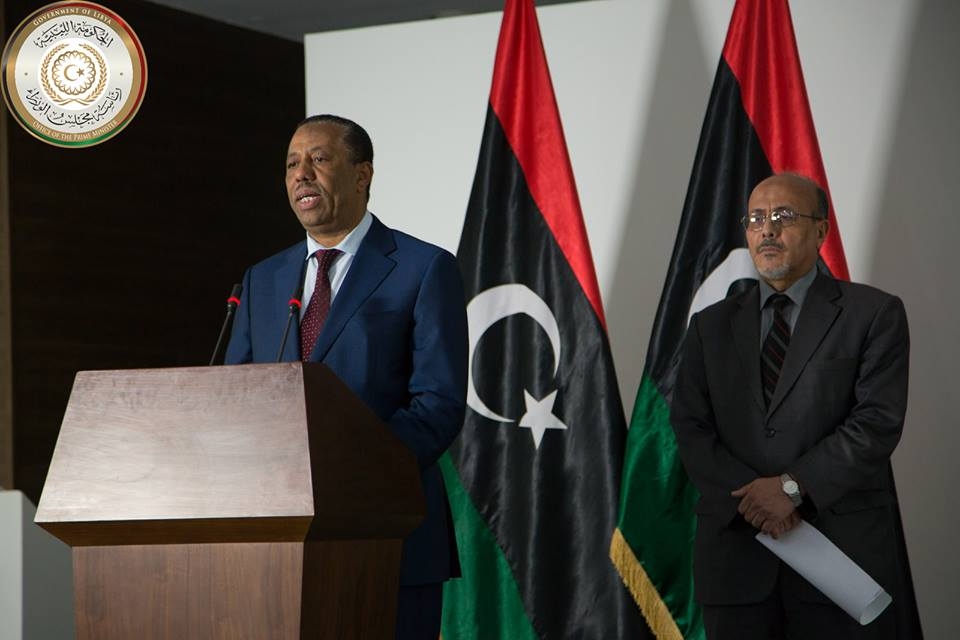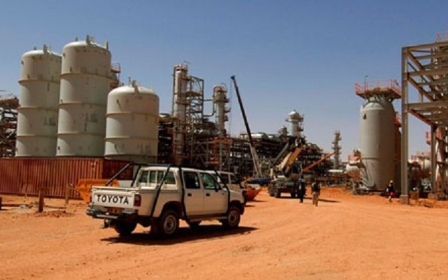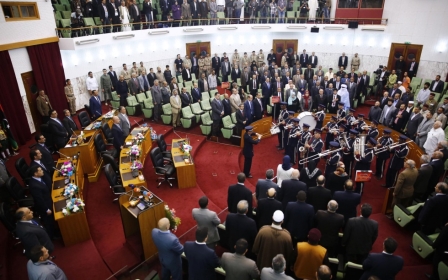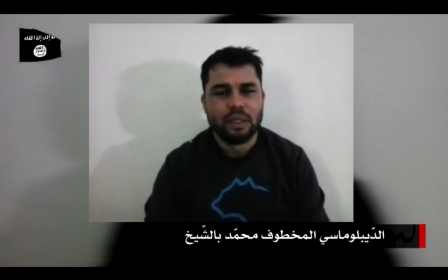Libya's prime ministers take power struggle to diplomatic arena

Two separate cabinet meetings were held in Libya on Thursday, amid a political crisis over the transition of power from interim Prime Minister Abdullah al-Thani to incoming premier Ahmed Maiteeq.
Ahmed Maiteeq, who was scheduled to take power this week, met with members of his team to discuss amongst other issues “the transition and ceding of power”, according to Maiteeq’s Facebook page.
A source in Maiteeq’s office told AFP that his team held a cabinet meeting in a luxury Tripoli hotel.
New MEE newsletter: Jerusalem Dispatch
Sign up to get the latest insights and analysis on Israel-Palestine, alongside Turkey Unpacked and other MEE newsletters
For his part, outgoing Prime Minister Thani also held a meeting with his own cabinet at the Prime Minister’s Chambers in Tripoli.
According to a statement on the Libyan Interim Government’s website, the meeting was called to discuss a varied agenda.
This included a decision to earmark 10 million Libyan dinars (US$ 7.9mn) for the repair of dilapidated buildings, though the parliament has yet to approve a budget for 2014.
On May 28, Thani held a press conference addressing what he called Libya’s “political crisis”, rejecting the election of Ahmed Maiteeq.
Along with representatives of his cabinet, Thani announced his refusal to cede power to incoming Prime Minister Maiteeq until a judicial decision regarding the legality of Maiteeq’s election.
Several members of Thani’s team have submitted a legal challenge, alleging that the vote that selected Maiteeq as prime minister was unconstitutional, according to the Moroccan news site Akhbar 24.
The parliament confirmed Maiteeq as incoming Prime Minister on 5 May, a day after the deputy speaker said the vote was invalid as it had failed to reach the necessary quorum.
Since Thani’s public refusal to cede power to Maiteeq on Wednesday, both men have been carrying out duties under the title of Prime Minister.
A Facebook page apparently speaking for the Libyan interim government published a photo on Thursday showing Thani meeting with the Russian charge d’affaires Leonid Frolov.
The accompanying post declared that Russia had confirmed its support for the “Libyan government’s attempt to build a state based on law and institutions”.
Seven hours later, a page apparently belonging to Ahmed Maiteeq posted pictures of the interim Prime Minister meeting the French and then the EU ambassadors to Libya in separate gatherings.
According to the second post by Maiteeq, the EU ambassador Nataliya Apostolova used the meeting to announce European support for “the new interim government” headed by Maiteeq.
The EU delegation to Libya told MEE that these reports were “incorrect”, stating only that “the EU supports a mutually acceptable solution to the issue of the government.”
The discord comes amid an ongoing worsening of the security situation throughout Libya.
On Thursday, former MP al-Tawati al-Aida told al-Fikra al-Yawm that he had survived an assassination attempt in the capital Tripoli.
He said he was attacked by gunmen outside a cafe, after taking part in a demonstration to protest the 26 May assassination in Benghazi of the journalist Miftah Abuzid, who was known for expressing a strongly anti-militia stance.
On Thursday evening Maiteeq held a press conference to call for calm throughout Libya on Friday, on what is expected to be a day of widespread protest, according to Libyan news site Akhbar Libya 24.
Libya is expected to go to the polls on 25 June to elect a replacement for the General National Congress, the interim body that took power after the 2011 ouster of Muammar Gaddafi.
So far only 1.4 million of the 3.4 million eligible voters have signed up to take part in elections, reports AFP.
Middle East Eye delivers independent and unrivalled coverage and analysis of the Middle East, North Africa and beyond. To learn more about republishing this content and the associated fees, please fill out this form. More about MEE can be found here.




